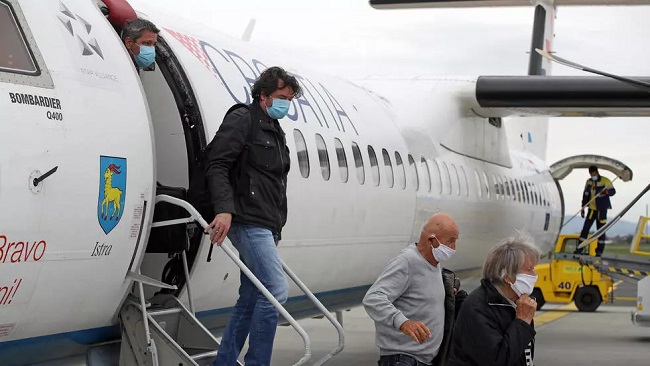10, July 2020
French Cameroun: Dion Ngute to open up Camair-Co to private capital in 2021 0
Joseph Dion Ngute, the Prime Minister of Cameroon, has told the Ministry of Finance to open up ailing state-run companies to the capital and management of the private sector next year, the African economic news agency Ecofin reported.
During a special cabinet meeting held to examine the budget and economic plan for the period 2021 to 2023, the prime minister presented guidelines to finance minister Louis-Paul Motazé on the viability of certain public companies in need of fresh financing.
Neither official named the enterprises concerned, but according to the 2019 report of the country’s Technical Commission for the Rehabilitation of Public Enterprises (Commission Technique de Réhabilitation des Entreprises du Secteur Public et Parapublic), a number of companies are in need of private capital and the comparative dynamism that comes with private management.
The report named Camair-Co (QC, Douala) as being one of them, alongside the National Refining Company (Sonara), the Cameroon Aluminium Company (Alucam), chemicals giant Cicam, the Chantier Naval shipyards, and the national telecommunications and postal services.
The prime minister instructed the finance minister to prioritise partnerships “by identifying those public enterprises whose capital can be opened to the private sector to relieve the public treasury and increase their performance,” a statement released after the meeting said.
Presenting the main points of the 2021-2023 plan before the parliamentary budget committee on July 5, Motazé explained that to remedy the unsustainable outflow of state revenue and avoid over-indebting the country, “public enterprises may be subject to measures aimed at improving their productivity and profitability,” as this would “help the state to increase its budget revenue, improve its job provision performance, and boost economic activity in the sectors in which these enterprises operate.”
Source: Ch-aviation.com


























24, July 2020
EU calls on US to lift tariffs in plane dispute 0
The EU called Friday on the United States to lift tariffs imposed in a long-running dispute over aircraft subsidies after Airbus said it had brought itself into compliance with World Trade Organization rulings.
The billions of dollars in tariffs, which apply to a wide range of food and agricultural goods in addition to planes, have been even more burdensome due to the economic disruption caused by the coronavirus pandemic.
Airbus said Friday it had reached agreement with the French and Spanish governments that raises the interest rates on funds provided to help develop its long-haul A350 jet to levels the WTO considers appropriate.
The European Commission said this removes any grounds for the US to maintain tariffs imposed on EU exports under WTO rulings as well as making a strong case for a rapid settlement of the dispute.
“Unjustified tariffs on European products are not acceptable and, arising from the compliance in the Airbus case, we insist that the United States lifts these unjustified tariffs immediately,” EU trade commissioner Phil Hogan said in a statement.
– Epic legal battle –
An epic legal battle between Airbus and Boeing at the WTO began in 2004 when Washington accused Britain, France, Germany and Spain of providing illegal subsidies and grants to support the production of a range of Airbus products.
A year later, the EU alleged that Boeing had received $19.1 billion worth of prohibited subsidies from 1989 to 2006 from various branches of the US government.
The two cases were then tangled up in a legal quagmire, with each side being given partial vindication after a long series of appeals and counter appeals.
In 2019 the WTO authorised the US to impose up to 100 percent in taxes on $7.5 billion of European goods, its biggest ever penalty.
Washington then slapped 25 percent tariffs on a number of EU goods including wine, cheese and olives.
A 10 percent tariff on Airbus planes was increased to 15 percent in March, which also affects US airlines which buy Airbus aircraft, as the manufacturer points out.
In June the US threatened to levy tariffs on another $3.1 billion in EU goods as it has been authorised to do under a WTO ruling.
– Resolution in ‘mutual interest’ –
Airbus said the impact of those tariffs plus the coronavirus pandemic were the reason it was making the effort to resolve the dispute.
“The tariffs imposed by the United States Trade Representative (USTR) are currently harming all targeted industry sectors, including US airlines, and are adding to a very difficult environment as a consequence of the COVID-19 crisis,” the firm said.
Airbus said Friday that it “considers itself in complete compliance with all WTO rulings” after increasing the interest rate paid on the government funds it received.
The low interest rates on these funds were one of the arguments the US made that the EU was improperly subsidising Airbus.
“After 16 years of litigation at the World Trade Organization, this is the final step to stop the long-standing dispute and removes any justification for US tariffs,” said Airbus.
In addition to there no longer being a justification for the tariffs, the EU believes that in light of the global recession triggered by the coronavirus pandemic it makes sense to resolve the dispute.
“Especially under the current economic circumstances, the EU believes that it is in the mutual interest of the EU and the US to discontinue damaging tariffs that unnecessarily burden our industries and agricultural sectors,” the Commission statement said.
Hogan noted a WTO decision is expected soon that could give the EU the right to impose tariffs against the United States.
“In the absence of a settlement, the EU will be ready to fully avail itself of its own sanction rights,” he warned.
Source: AFP